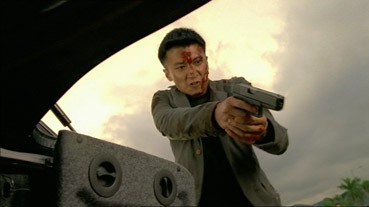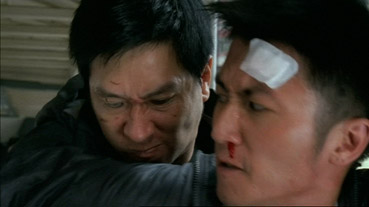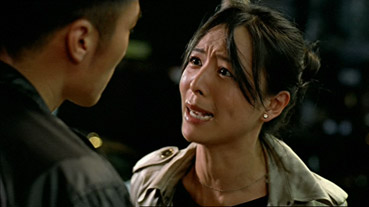|
There are, it has to be said, certain things you come to expect from a Hong Kong crime thrillers once you've seen a few. Both the male and female lead players will be strikingly good-looking (though this is possibly a reflection on my personal definition of beauty), the pace will be brisk, the action hard-hitting, and surprises will often be genuinely startling. It's also likely than when something tragic happens, the sentimentality tap will be turned on to maximum, but that's something we've had to learn to live with. Whether the said film will also be dramatically involving is very much down to the script and direction, as it would be anywhere, but when those elements click the results can be electrifying, as with Wai-keung Lau and Alan Mak's justly celebrated Infernal Affairs [Mou gaan dou] trilogy and the pre-Hollywood work of a certain John Woo.
The Beast Stalker [Ching yan] ticks all of the above boxes and arrives in the UK on the back of strong word of mouth and a few award wins. It's saddled with an English title that makes it sound like an African safari adventure but is more likely a reference to director Dante Lam's otherwise unrelated 1998 hit Beast Cops [Yeshou xingjing]. Central to the story here is self-assured and demanding plain clothes cop Sergeant Tong Fei (Nicholas Tse), whose determination to force criminal kingpin Cheun (Kong Lau) off the road results in a three-car crash that leaves himself, his colleague Sun (Kai Chi Liu) and the three occupants of Cheun's car seriously injured. But there's more, an unxpectedly tragic consequence of Tong's actions whose shock reveal I'm reluctant to spoil, even though such restraint will make discussing what follows in any detail a little tricky. But I'll give it a go.

Three months later Cheun has recovered from his injuries enough for public prosecutor Ann Gao (Jingchu Zhang) to proceed with the case against him. Ann also suffered as a result of the crash (sorry, my above pledge means I can't say how) and wants nothing to do with Tong, who is still carrying his share of physical and mental scars. With the prosecution case hanging on a single blood sample, Cheun's men engage facially damaged thug-for-hire Hung (a very impressive Nick Cheung) to kidnap Ann's young daughter Ling (Suet-yin Wong), agreeing to release her only if Ann hands this key piece of evidence over to them. Desperate to make amends for his earlier actions and despite being ordered to leave well alone by Ann, Tong becomes determined to locate and rescue Ling.
This simple and even formulaic plot is fleshed out by Lam and his co-writer Wai Lun Ng into something more substantial by focussing on the characters, their relationships, and what drives them to make the decisions they do. That Tong is on a quest for redemption is no big surprise and is even acknowledged in the dialogue, but Hung's motivation is not so clear cut. While his stony countenance, facial disfigurement and willingness to kidnap and presumably kill a small child (Ling is not his first assignment, and we are shown what happens to her predecessor) would seem to mark him as an archetypal old-school evil villain, he is revealed to be a tragic and even sympathetic figure, one blighted by misfortune and driven by desperation, a man whose current fate has been unknowingly shaped by the very people who now pursue him.
Technically there's much to admire here, despite the popular reliance on twitchy camerawork and post-production picture fiddling. The pace rarely drops, the chases are exciting, and save for some glaringly artificial CG breaking class, the pivotal car crash is spectacularly handled. The narrative also holds its share of rewards, with some neatly timed twists and an enjoyable but tightly rationed use of police tracking technology, while the full extent of the character connectivity is kept nicely under wraps to be later revealed in precision-timed flashbacks, the last of which helps take the sting off an over-emotional and by-the-book conclusion to the main story. That character arcs play out pretty much by the numbers is a tad disappointing and results in two occasions – both involving the young Ling – where film dares to walk a dark and dangerous path and then bottles out at the last minute. While this may play effectively to mainstream expectations, I couldn't help wondering if a Korean equivalent would have so willingly let the audience off the emotional hook.

Memories of Murder this is not, but Beast Stalker is still a solidly structured, earnestly performed and slickly made drama-cum-crime thriller in which the action provides the pulse but the characters the emotional heart. It makes slick use of its borrowings (the concept of three stories linked by a car crash has been nabbed from Amores Perros, while the more sinister chords of the score are lifted straight from Howard Shore's climactic music for Se7en) and blends them with fresh ideas of its own, from the realistic scrappiness of the physical conflict to the scene in which a colour-blind Hung has to enlist the help of his young captive to identify some urgently required but specifically coloured pills, a sequence whose importance to subsequent character actions can only be appreciated in retrospect.
Hello hello, is that a double image I see on every other freeze frame? And isn't that running time the same as the cinema print with no PAL speed-up? Yep, we appear to have an NTSC to PAL conversion here, but fortunately it's a good one, with consistently impressive sharpness and pleasing colour and contrast, at least within the judgement restrictions imposed by the post-production grading. This does intermittently result in some burned-out whites that occasionally give the image an HD look (emphasised by the anamorphic 1.78:1 framing), despite the fact that it was shot on 35mm film. Some compression artefacts are visible on areas of single colour, including blacks, but the motion issues associated with standards conversion are thankfully minimal.
The original Cantonese track is available as Dolby 2.0 stereo or 5.1 surround, and my guess is that the stereo track was the original and the 5.1 has been achieved simply by recoding that as AC3. The stereo track is fine on clarity and range and has distinct frontal separation on some effects, which are identical on the 5.1, where there is precious little use of the surrounds, particularly for directional effects. 5.1 also appears to have developed a levels glitch in the recoding, with some of the dialogue (Tong's early shouting at his troops is a good example) reduced dramatically in volume compared to other sounds and voices, while gunfire at a firing range has none of the punch it has on the stereo track. A 5.1 English dub is also available, where the dialogue is louder, American accented, and impossible to take seriously.
Disc 1
Trailer (1:28)
A lightning-cut trailer with a couple of giveaways, including the one I've gone out of my way not to reveal above.
Extended/Alternate Scenes (20:07 total)
Eight extended and alternate scenes that range from 26 seconds to almost 5 minutes in length, some of which expand on character (an extended sequence with Hung and his wife, one in which Ann talks about Ling with her ex-husband), while others extend existing scenes (the Police visit to Hung's flat, the death of the first hostage). An alternate ending is also included, one that wraps everything up even more tidily than the one we have. Although missing the sound for the first half, a sequence in which Tong follows and loses Ann is nicely done.

Disc 2
There are four short featurettes under the banner of Behind the Scenes:
The Car Chases (8:40)
A fascinating look at the shooting of the pivotal car crash, particularly for the low-tech ingenuity employed to roll and spin cars and an alarming moment when a flipped vehicle clips the camera that's filming it. A later chase involving a leap from an ambulance is also covered, but is not as interesting.
Scaling the Sign (6:58)
A stand-back-and-watch record of the shooting of a street argument and the scaffold climb that follows. No real surprises, save for the precarious-looking rig the camera operator is suspended by, but it's nice to know that Nicholas Tse did the whole seven storey climb for real.
The Street Chase (4:05)
Another watch-from-a-distance piece that offers a brief look at filming the chase of the title.
Little Actors (5:19)
Shooting the climax with young actress Suet-yin Wong, who plays Ling, and a brief bit of the kidnap sequence. Again, not too enlightening, but it has it's enjoyable moments.
Making Of (13:58)
An EPK featurette in the usual Hong Kong style, with extracts of the film and behind-the-scenes footage fast cut with cast and crew interviews and an ever-shifting music score. Interesting enough, but paced even faster than the film itself – look down for a second and you'll miss at least two subtitles.
The Interview Gallery has four entries:
Nicholas Tse (16:54)
Leading man Tse outlines the plot, profiles his character and talks about aspects of the shoot, including working with young Suet-yin Wong (something that clearly had an emotional effect on him as a new father), the mechanics of the car-roll, climbing the scaffolding and his determination restrain his body language in the fight scenes and not turn Tong into a martial arts supercop.
Jingchu Zhang (16:19)
Lead actress Zhang, who plays Ann Gao, talks at some length about her character and the story (definitely don't watch this one before the feature), but also covers working with co-star Tse, director Lam and the child actors, and the difficulty of doing emotional scenes on street locations.
Nick Cheung (12:02)
Cheung follows the lead of his co-stars by outlining the plot and talking about the role of Hung, for my money the most interesting character in the film. He also discusses working with the children, one of whom was forward about criticising his performance ("Is my acting so bad," he muses, "that even a child realises it?"), and reflects on working with director Lam and the humanity of the story.
Dante Lam – Director (13:29)
By this point it was clear that an unseen and unheard interviewer was asking everyone the same questions (they were certainly filmed against the same background), and there's thus no surprise when director Lam talks about the story, the characters, and what it was like working with the child actors. He does discuss his relationship with Tse and his long-standing desire to cast him in a part that tested his acting abilities more than his usual action roles do.
Not quite the new standard setter that advance publicity has suggested, but a well made, smartly structured and generally gripping dramatic thriller nonetheless, commendable for the realism of its fights and street chases, some well calculated tension and plot twists, and its focus on character. A true PAL transfer would have been nice, but the conversion here is better than most, and some of the extra features are definitely worth a look.
|